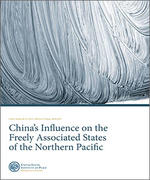A USIP Fact Sheet
Over the last two decades, a shifting international order and the resurgence of strategic competition among powerful states has raised the potential for geopolitical rivalries to spur and worsen violence. Rising competition between the United States and China has exacerbated tensions over longstanding potential flashpoints between the two countries. China’s expanding international presence has extended into conflict zones and fragile states of strategic interest to the United States. Beijing is also actively working to revise global governance institutions in ways that threaten U.S. national security interests.
USIP’S Work on China
The Institute’s work on China has two primary objectives: preventing violent conflict between the United States and China and countering China’s destabilizing behavior and malign influence in other countries that could potentially draw the United States into a costly war. Through bipartisan convenings, coordination with allies and partners, and independent research, USIP recommends steps to protect and advance U.S. national interests while avoiding unwanted escalation.
Averting Crisis with China
Amid heightened tensions, mistrust and geopolitical competition, USIP assesses and, where possible, helps to mitigate the risk of conflict between the United States and China. Through its bipartisan convenings, expert analysis and thought leadership, USIP identifies strategies for deterrence, de-escalation and crisis management to help keep the United States safe, strong and prosperous.
Countering China’s destabilizing behavior and malign influence
As China grows more engaged around the globe, its actions have both direct and indirect effects on conflict dynamics and efforts to manage violence. USIP offers evidence-based analysis of China’s activities and strategic objectives in places of strategic importance to the United States, such as Taiwan and the Philippines, and their implications for U.S. national security. By assessing the impact of China’s behavior on efforts to prevent and resolve violent conflict, USIP suggests options for ways the U.S. government and other key stakeholders can address these challenges without fighting a costly war.
Contributions to Peace
Strengthening U.S. alliances in the Indo-Pacific
The U.S. network of mutually beneficial alliances and partnerships in the Indo-Pacific region gives it a strategic advantage that Beijing — whose own regional relationships are often coercive or transactional — deeply resents. By working with experts and officials across the Indo-Pacific, including Australia, India, Japan, the Philippines, Palau, South Korea, and Taiwan, USIP advances these U.S. alliances and partnerships, including through coordinated efforts to track and respond to China’s malign influence and destabilizing behavior.
Combating China-linked transnational crime
Over the past decade, organized crime groups from China have built a vast network of influence across Southeast Asia. They have used this network to establish a web of industrial-scale scam compounds that are built on forced labor and steal more than $64 billion per year. This scam industry, which thrives in conflict-afflicted countries like Myanmar, increasingly threatens U.S. national security and could soon rival fentanyl as one of the top dangers that Chinese criminal networks pose to the United States. USIP works with local researchers and government officials to expose these syndicates and support law enforcement efforts to shut them down and prosecute the perpetrators.
Advancing strategies to prevent conflict and manage competition
USIP provides thought-leadership grounded in regional expertise and decades of experience in conflict management to identify ways to improve crisis management and de-escalation mechanisms and strengthen deterrence vis-à-vis China. USIP provides military planners, diplomats and our partners around the world with expert advisory support, field-tested analysis and strategic gaming exercises to help expand U.S. influence in places where China’s actions could lead to conflict.
Helping others counter China’s destabilizing behavior
USIP supports original research and analysis to help increase transparency around China’s malign influence in the Indo-Pacific, Africa and Latin America, as well as its impact on U.S. national security interests. Recent analyses examine and assess implications for U.S. national security regarding the China-Pakistan military relationship, China and strategic instability in space, China’s security force posture in Southeast Asia, China’s search for a permanent military presence in the Pacific Islands, and Chinese professional military education in Africa.
Leading senior study groups on China’s impact on conflict dynamics
USIP leads a series of bipartisan, expert-level working groups made up of senior scholars and practitioners that examine China’s role in specific conflicts around the world. These reports offer new insights into China's presence and impact in places such as Myanmar, North Korea, the Red Sea, South Asia, and the Pacific Islands and generate recommendations for ways the U.S. government and other key stakeholders may more effectively promote peace and advance U.S. national security interests in places where China’s influence is growing.
USIP’s fifth bipartisan Senior Study Group on China examined China’s influence in the Pacific Islands. The SSG assessed how China’s growing presence is affecting political, economic and security trends in the region, and generated recommendations for the U.S. government and other key stakeholders to protect U.S. interests and maintain peace and security in the Pacific.
